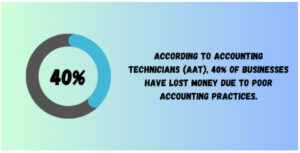Many real estate agents struggle with keeping track of income and expenses properly. And it makes sense. Between fluctuating commissions, deductible expenses like travel and marketing, and inconsistent cash flow, real estate finance can get complicated fast.
That’s why real estate bookkeeping isn’t just a nice-to-have. It’s a must as it helps you stay organized, avoid tax-time stress, and make smarter money decisions that support long-term growth.
So, in this article, we’ll discover why real estate bookkeeping matters and how it can bring control to your business.
What Makes Real Estate Bookkeeping Necessary?
Bookkeeping for real estate professionals is different from handling finances for a traditional business as it’s more complex and unpredictable. The reasons include:
1. Commission-Based Income
One of the biggest challenges is that your income depends entirely on deals closing. And since transactions can take weeks or months to finalize, cash flow is often inconsistent.
According to the National Association of Realtors, the gross income of real estate agents in the United States is $47,174, but that income was far from evenly distributed month to month.

Without a proper small business bookkeeping system, it becomes hard to track when money is coming in and how it aligns with your business expenses. You could be spending thousands in marketing and staging long before a commission ever hits your account.
2. High Volume Deductible Expenses
Real estate professionals rack up a wide range of business expenses that need to be tracked accurately for tax deductions. These include:
- Fuel and mileage for showings and open houses
- Advertising and online marketing
- MLS fees and licensing
- Client gifts and meals
- Office supplies and tech tools
- Home staging or photography services
The IRS allows many of these as deductions, but missing even a few can cost you thousands each year. Without organized records, you’re either overpaying on taxes or risking IRS tax audits with inaccurate reporting.
3. Multiple Revenue Streams
Many agents don’t just earn from commissions alone. They may receive referral fees, property management income, or revenue from rental investments.
So, if you’re handling multiple streams and not tracking each income source separately, it’s easy to lose sight of what’s truly profitable in your business.
4. Tax Complexity
Unlike W-2 employees, most real estate professionals operate as independent contractors or LLCs. This means you’re responsible for self-employment taxes, quarterly estimated payments, and keeping detailed expense records to avoid trouble with the IRS.
In fact, an estimated 30% of small business owners say that they overpay their taxes and real estate agents are also one of them simply due to poor bookkeeping.

5. State-Specific Regulations
Real estate laws and tax codes vary by state. Some states have strict rules around how commissions must be paid, how escrow is handled, or what records brokers must keep. You can do all that and ensure compliance with both state and federal levels by using a specialized real estate bookkeeping system.
Four Reasons Bookkeeping Matters for Agents and Brokers
Here’s why real estate bookkeeping is a game-changer for agents and brokers:
1. Cash Flow Control = Business Survival
Real estate income is unpredictable. You might go a month without a paycheck, then close three deals in one week.
Even surveys show that 69% of self-employed professionals (small businesses) say cash flow issues keep them up at night and have impacted their business as well.
By using a real estate bookkeeping system, you can forecast income, plan for lean months, and make sure you’re not spending money you don’t actually have.

2. Stress-Free Tax Season
If you’ve ever scrambled to pull receipts together in March, you already know, bookkeeping saves your sanity at tax time. Organized financial records make it easier to track deductions, file accurately, and avoid penalties.
More importantly, missing out on deductions means overpaying. The IRS allows real estate agents to deduct business miles, marketing costs, home office space, client gifts, and more but only if you have solid documentation.
3. Audit Protection You Didn’t Know You Needed
No one expects to get audited… until they do. And while audits are rare, when they happen, poor bookkeeping is a red flag.
If you’re audited and your records are incomplete, the IRS may disallow your deductions or worse, hit you with fines and interest. Clean, up-to-date books show that you’re a serious professional running a legitimate business.
4. Smarter Business Decisions
Professional bookkeeping is also about strategy. When you know exactly where your money is going and what’s bringing in the most revenue, you can double down on what works and cut what doesn’t.
Want to know which lead source gives you the highest ROI? Or how much do you really spend on client dinners? Your books have the answers. And those answers help you run a leaner, more focused business.
Common Mistakes Real Estate Professionals Make Without Proper Bookkeeping
Without a structured bookkeeping system, it’s easy to make bookkeeping mistakes that seem small at first but add up quickly. So, here’s what real estate professionals face when bookkeeping isn’t a priority:
1. Missing Tax Deductions
Real estate professionals often incur various expenses, such as marketing costs, travel, and office supplies. And without meticulous record-keeping, it’s easy to overlook these deductible expenses.
According to Accounting Technicians (AAT), 40% of businesses have lost money due to poor accounting practices.

2. Difficulty in Tracking Commision Structures
Business transactions in real estate often involve complex commission structures, including splits with brokers and referral fees. But if your records are unorganized, it will become challenging to verify that all earnings are accurately accounted for, potentially resulting in lost income.
3. Lack of Preparedness for Financial Planning
Accurate financial audits and records are important for effective business planning and securing financing. Moreover, in order to secure financing, you need detailed financial statements to assess creditworthiness. It can hinder opportunities for growth and investment for your business if your records are incomplete.
Let SmoothBooks Handle the Numbers So You Can Close More Deals
Real estate bookkeeping might not be the most exciting part of your business, but it’s one of the most important. It’s about protecting your income, claiming every possible deduction and staying tax-compliant.
If you’ve been managing your books on the fly or letting them pile up between closings, now is the time to make a change.
At SmoothBooks, we specialize in affordable bookkeeping services customized to independent real estate professionals and growing brokerages.
Let us take the books off your plate — so you can focus on closing your next deal.

